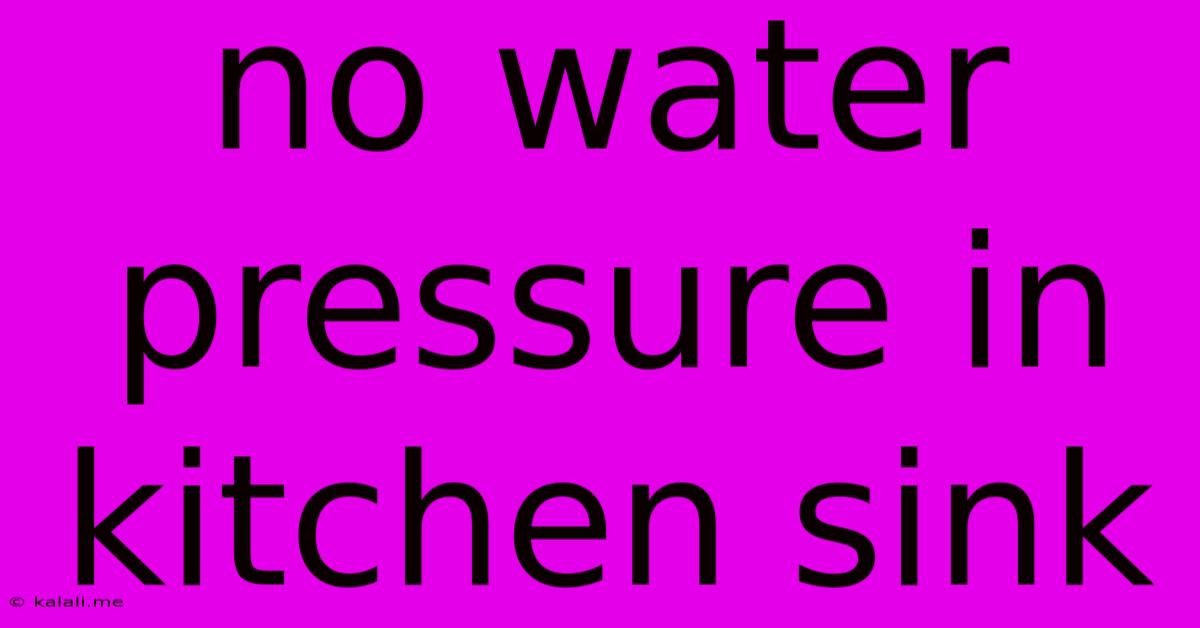No Water Pressure In Kitchen Sink
Kalali
May 24, 2025 · 3 min read

Table of Contents
No Water Pressure in Kitchen Sink: Troubleshooting and Solutions
Low water pressure in your kitchen sink is a frustrating problem, leaving you struggling with weak streams and long wait times for filling pots or washing dishes. This article will guide you through troubleshooting the issue, identifying potential causes, and providing effective solutions. Understanding the root of the problem is key to restoring full water pressure quickly.
Why is my kitchen sink water pressure low? The culprit could be anything from a simple clog to a more significant plumbing issue. Let's explore the most common causes and how to address them.
1. Clogged Aerator
The aerator, a small screen at the end of your faucet spout, mixes air with water to create a smooth stream. Over time, mineral deposits, sediment, and debris can build up, restricting water flow.
- Solution: Unscrew the aerator (usually by hand, sometimes needing pliers) and clean it thoroughly under running water. Use a small brush or toothpick to remove stubborn clogs. If heavily mineralized, soak it in white vinegar for a few hours. Reinstall the aerator once clean.
2. Clogged Faucet Screen
Similar to the aerator, the faucet screen, located inside the faucet body, can become clogged. This screen filters out larger particles, but can become blocked by sediment, rust, or other debris.
- Solution: This usually requires accessing the faucet's internal components. Consult your faucet's instruction manual for specific instructions. Generally, it involves removing the handle and accessing the screen for cleaning. If you are uncomfortable with this, call a plumber.
3. Low Water Pressure Throughout the House
If the low pressure affects other faucets or fixtures, the problem lies beyond your kitchen sink.
- Solution: Check your main water shut-off valve to ensure it's fully open. Inspect your water meter for unusual activity, indicating a leak. Low water pressure across the entire house could signify issues with your main water line, water pressure regulator, or even a problem with the water company's supply. Contact a plumber or your water utility company to investigate further.
4. Sediment Buildup in Pipes
Over time, mineral deposits and sediment can accumulate inside your water pipes, restricting water flow. This is more common in older homes.
- Solution: This is a more complex issue and may require professional intervention. Flushing the water lines with a high-pressure system can help remove some buildup. In severe cases, pipe replacement might be necessary.
5. Faulty Faucet Cartridge or O-rings
If the problem is isolated to your kitchen sink faucet, a faulty internal cartridge or worn-out O-rings could be at fault. The cartridge controls the water flow, and worn O-rings can cause leaks and reduced pressure.
- Solution: Replacing the cartridge or O-rings often involves disassembling the faucet, a task best left to someone with plumbing experience. Refer to your faucet’s instruction manual or consult a plumber if unsure.
6. Partially Closed Valves
Check all valves along the water supply line to your kitchen sink, including shut-off valves under the sink and any valves further along the water line. A partially closed valve can significantly restrict water flow.
- Solution: Ensure all valves are fully open.
7. Clogged Pipes Under the Sink
Check the pipes under your sink for any visible blockages or kinks. A severe clog in the drain line can sometimes impact water pressure in the supply lines.
- Solution: Clear any visible clogs. If you suspect a blockage further down the drainpipe, use a plumber's snake or call a professional for assistance.
By systematically addressing these potential issues, you should be able to pinpoint the cause of your low kitchen sink water pressure and restore a satisfying flow. Remember, if you're uncomfortable tackling plumbing repairs yourself, don't hesitate to call a qualified plumber. They have the tools and expertise to diagnose and fix more complex problems efficiently.
Latest Posts
Latest Posts
-
Difference Between Convection Bake And Bake
May 24, 2025
-
Let The Chips Fall Where They May
May 24, 2025
-
Are Roma Tomatoes Determinate Or Indeterminate
May 24, 2025
-
How Do You Unclog A Garbage Disposal
May 24, 2025
-
How Do You Clean Sleeping Bags
May 24, 2025
Related Post
Thank you for visiting our website which covers about No Water Pressure In Kitchen Sink . We hope the information provided has been useful to you. Feel free to contact us if you have any questions or need further assistance. See you next time and don't miss to bookmark.